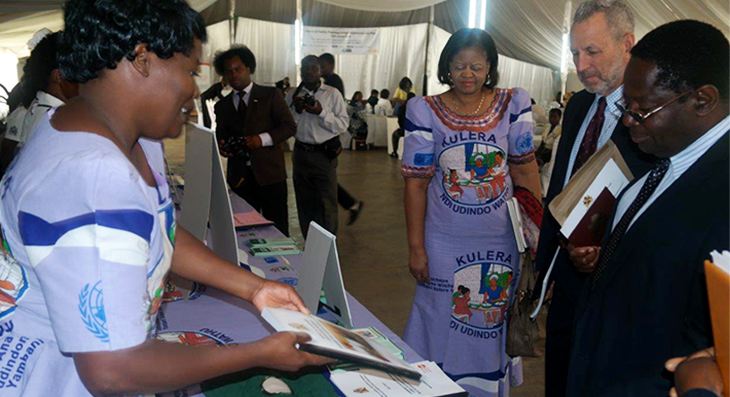The Health Policy Project ended in 2016. Work continued under Health Policy Plus (HP+) until 2022.
NEWS & VIEWS

Photo by Health Policy Project
September 16, 2015
LILONGWE, Malawi—Malawi’s Ministry of Health launched the Malawi Family Planning Costed Implementation Plan, 2016–2020 (FP CIP) on September 15, 2015 in front of a crowd of over 100 people. Full implementation of the FP CIP could result in an increase in the modern contraceptive rate from 33 percent to 60 percent by 2020. Full implementation of the plan is also expected to avert about 2.2 million unintended pregnancies. The total cost of the plan is US$94.6 million between 2016 and 2020.
The plan addresses seven thematic areas that are essential for effective implementation of family planning activities: demand generation; service delivery and access; contraceptive security; financing; policy and advocacy; stewardship and governance; and supervision, monitoring, and coordination. Strategic priorities were also identified to ensure that current family planning gaps were addressed, including providing family planning information and access to services for specific groups including youth, rural populations, and the urban poor (see below for the full list of strategic priorities)
The USAID-funded Health Policy Project (HPP), implemented by Futures Group, in collaboration with FP2020 and the United Nations Population Fund (UNFPA) supported the Ministry of Health throughout an intensive five-month process to develop the plan. Malawi’s Family Planning Technical Working Group and the Ministry of Health, Reproductive Health Directorate (RHD) requested the FP CIP for Malawi. As part of the development process for the FP CIP, the RHD the partners supported the RHD to conduct a comprehensive situational analysis, including a desk review and consultations; identify strategic priorities; and solicit strong stakeholder input. The ministry was also supported in the development of an implementation timeline and in the determination of costs.
“As a ministry we believe that for the government to reach a mCPR of 60 percent we need a CIP” said the Honorable Secretary for Health Dr. M.P. Magwira, during his speech at the launch. He further acknowledged that family planning is one of the most cost-effective services worldwide and a major contributor toward the improvement of women’s and girls’ empowerment in Malawi.
Dorothy Nyasulu, the deputy country representative for UNFPA Malawi, said, “We [UNFPA] are convinced that the thematic areas in the CIP will achieve the 2020 mCPR target” while calling on other stakeholders to join her in supporting the implementation of the plan.
Fannie Kachale, Director of the Reproductive Health Directorate, also called on partners, donors, and government officials to work together for the implementation of the CIP stating, “I am delighted that we have the CIP, but developing the document is one thing, we need everyone to hold hands together to achieve the goals within the document.”
Other attendees included the chair of the Parliamentary Committee on Health, the Ministry of Health Education Unit, and the Ministry of Health Nursing Directorate. A large number of local district health officers, local chiefs, implementing partners, and donor organizations also attended.
Malawi’s FP-CIP aligns with the Health Sector Strategic Plan 2011–2015; the National Youth Policy 2013; the National Population Policy 2012; and the recently launched National Youth Friendly Health Strategy. However, the FP-CIP serves as a single comprehensive document whose aim is to specify interventions and activities to be implemented and to itemize the financial and human resources needed to meet the comprehensive national FP goals. This will help women achieve their human rights to health, and contribute to the deceleration of Malawi’s rapidly growing population.
Malawi Family Planning Costed Implementation Plan, 2016–2020: Strategic Priorities
- Priority # 1: Improve the ability of individuals within the population as a whole, as well as specific groups (e.g., adolescents, rural populations, urban poor) to achieve their fertility desires by providing accurate information about sexual and reproductive health, information on how fertility is linked to general health and well-being, and where and how to access desired services
- Priority # 2: Expand youth access to accurate and actionable information and family planning services, and promote youth rights to make their own fertility choices
- Priority # 3: Ensure new and existing health care workers receive adequate practical training in the full FP method mix, and empower community health workers and frontline workers to provide counselling and referral services, as well as short-term methods
- Priority # 4: Promote multisectoral coordination at the national and district levels, and integrate family planning policy, information, and services across sectors
- Priority # 5: Ensure commodity availability through strengthening logistics management systems and distribution of family planning commodities
- Priority # 6: Increase the sustainability of family planning through government commitment, integration of the private sector, and diversification of funding sources for family planning activities and commodities
What's New
- Something to Build On: “Innovation Exchange” Celebrates the Health Policy Project’s Close and a New Beginning
- What Will it Take for Tanzania to Achieve ART Targets and Ensure Long-Term Sustainability of the HIV Response?
- Helping Kenya’s County Leaders Advocate for Increased Health Investments
- HPP Holds Working Meeting on Ensuring Responsible PEPFAR Transitions for Key Populations
- Health Policy Project Celebrates 2016 International Women's Day
- HPP Staff Participate in White House Conference on HIV Stigma Reduction

